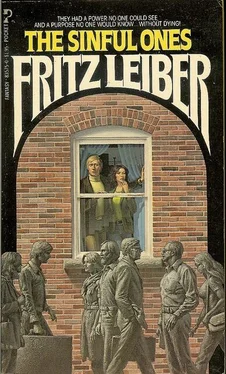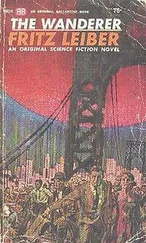Carr’s vision cleared. He stepped across the ribbon of water and walked unsteadily up the embankment.
Chapter Fifteen
Quiet, Daisy
Carr opened the door of his apartment, steadied himself against the frame. The windows were still black with night. He softly called, “Jane?” There was no answer. He slumped a little. His head felt painful, his body fagged, his clothes wretchedly uncomfortable.
He listed to the faint, throaty machine-hum of 4 A.M. Chicago, like the purring of a circle of vast, crouching cats. He shivered. Then he gathered himself together, shut the door an switched on the light.
He glanced at the letter he had automatically snatched from his pigeon-hole downstairs. It was from Marcia. No need to look at that one. He had read it—let’s see—two nights ago. He tossed it down.
A propped rectangle of paper on the mantle caught his eye. There were only a few lines of writing on it. His chest felt tight as he read the signature: “Jane.”
The writing was more hurried and crabbed than any of hers he had seen before, but he quickly made it out.
This place is no longer safe. I’ve gone to the old mansion, to my place on the third floor. Come to me there.
It seemed to Carr that the distant purring grew a shade more deep and menacing. He went to the bureau, rummaged around, found a flashlight. It made only an old yellow glow, but he stuck it in his pocket.
Outside in the late darkness, the streets were more deserted than he had ever known them. His footsteps seemed to echo for blocks. He felt a vague gratitude toward the chance forces that had made a path for him, that had cleared the way of automatons. For he was fearfully tired. Only the thought that he would soon be with Jane kept him moving. The awful discoveries of the past days weighed on him as crushingly as if his body were a clumsy metal machine that he must hold up with the feeble strength of flesh and sinew. If he could now go back to his appointed place in life, he felt that he would never have more strength than to do merely his machine work. He would be a machine and nothing more than a machine.
If only he and Jane could go back…That possibility now seemed to him infinitely desirable, infinitely distant. The drunken words of Old Jules the bargeman repeated themselves in his memory—hollow, remote, a childishly futile challenge to a dead universe.
The blocks dragged slowly by. All that actually seemed to change was the quality of his footsteps’ echoes, as they came now from this wall, now that.
The emptiness of the streets was phenomenal. For a while he toyed dully with the notion that Chicago had been emptied of all its automatons, until he passed a single figure in a dark, shiny coat standing by the street car tracks a block from his destination.
Weariness came at him in waves. It occurred o him that although he had only now learned that the universe was a machine, it had always felt like one. His head sagged.
He found his hands loosely circling black wrought iron bars. He gripped them tighter to rouse himself, and looked up. As in a dream, the old mansion showed as a colorless, shadow-wrapped pile in the first paleness of dawn. All the windows were blind, the lower with boards, the upper with jagged edged blackness. As he made his way up the weedy drive, past the old “For Sale” sign, a tiny wind rustled the dark leaves overhead, then died. The odor from the rank garden was bitter and strong.
The big door under the porte-cochere was an inch ajar. He listened for a moment, then pushed at it. It scuffed complainingly across humped-up carpet, as the gate had across gravel.
He stepped inside, and instantly half his weariness dropped away, as if the old house demanded alertness as its due. The odor changed from bitter to musty, with a hint of water-rot. The dingy beam of his flashlight revealed a floor half-carpeted, half bare; walls cobwebbed with soot showing slightly paler rectangles where pictures had once hung; two shapeless bulks of covered chairs; a wide and curving stairway with an elaborately carved, key-thick newel post; several dark, wide doorways.
He glowed his light into the latter openings, revealing more dirt and emptiness and, down the one leading toward the back of the house, the foot of a second and narrower stairway.
He stood just inside the door, conscious of a mounting anxiety. He realized that he was waiting for Jane to call to him, that he had expected his questing flashlight beam to reveal her face. It occurred to him for the first time that it was strange she should arrange to meet him on the third floor, and that she couldn’t call out or come down, now that she must hear him coming.
He crossed to the wider stairway, straining his ears after each step, and started up it. He switched off his flashlight. The treads creaked faintly under his weight. The odor of old dust grew thicker—even his cautious footsteps must be raising puffs of it. He gazed up the oval stairwell at the smaller oval of paler gloom marking the ceiling of the third floor, where the broken windows must be letting in a little light. It seemed to him that the smaller oval showed an irregularity, as if perhaps a head were peering down. But when he moved up another step he could no longer see it.
For some reason, his imagination kept picturing, not Jane, but the figure in the dark raincoat he had passed back by the car tracks. He had hardly glanced at its face, but now he found himself wishing he had, for he was conscious of a belated sense of recognition.
He paused on the second floor landing, then continued up. After six steps he stopped dead.
There could be no mistaking it now. There it thrust above the heavy banister at the head of the stair, the darkness of a head against the faintly lesser darkness of the wall. The silence seemed to congeal around him as he peered at it.
Suddenly he pointed his flashlight, switched it on. In the yellow circle he saw Jane’s face, staring at him in terror.
He called he name, rushed up the last steps. Then they were in each other’s arms. Carr felt the last of his weariness vanish, then return momentarily with a rush, so that he swayed at the stair-head, hugging her drunkenly.
“Darling, I was so afraid it wasn’t you,” she said in a breath, her fingers digging into his shoulders. “Why didn’t you call out?”
“I don’t know,” he answered stupidly. “I was expecting you to.”
“But I couldn’t be sure it was you,” she told him. “Why were you so long? It was waiting here in the dark that frightened me. It’s been hours and hours. What happened to you?”
In a few slow sentences he explained why he had run away from her and sketched for her his plunge into the river and rescue by the bargeman.
“Yes, but afterwards?” she pressed. “What did you do afterwards?”
“I came straight here,” he told her, “as soon as I got back to my room.”
“You couldn’t have,” she said, stepping back a little. “It’s been hours.”
“What do you mean?” he asked puzzledly.
“And how did it all happen so quickly?” she continued rapidly. “The business with the bargeman, I mean. It couldn’t have been more than half an hour after I lost you by the library that I hurried back to your room, yet when I got there, your note was waiting for me.”
He took her arms. The silence of the old house became deadly. My note?”
“Yes, telling me to come here and wait for you.”
He tried to study her expression in the dark gray light. Under his hands he felt her arms grow rigid, as though his own gathering fear was seeping over into her.
“Jane,” he whispered, “I only got back to my room twenty minutes ago, I didn’t leave any note. I came here because of yours.”
Читать дальше









